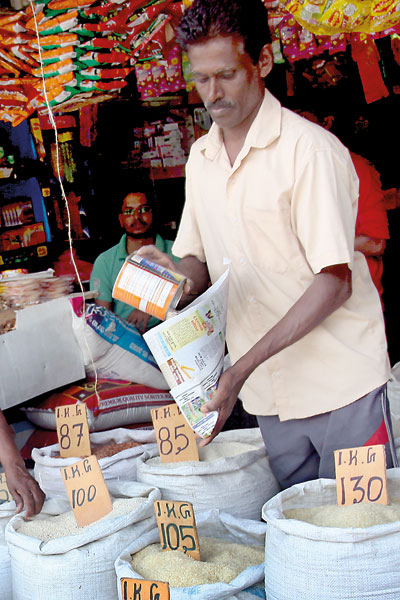News
Viable bags, green wrappers emerge from local initiatives
Sri Lankans have been inspired to think of alternatives to destructive polythene and a few ideas have so far emerged to challenge the machinations of industrialists bent on producing unwanted carrier bags by the millions of pieces.

Kelaniya University shows the way: The lightweight fabric bag. Pix by Athula Devapriya
Housewives and academics have shown the public, locally made substitutes for lunch sheets and shopping bags.
The University of Kelaniya has crafted a lightweight fabric bag that it says can hold five kilograms. Director of the Centre for Sustainability and Solutions, Dr. U. P. K. Yapa said the the bag is made from a mixture of polyester and nylon. It can be folded and carried in a pocket, or a handbag. It can be washed and re-used and could last up to a year.
Such foldable, reusable bags are plentiful in supermarkets and shops overseas and have been available for years.
Dr. Yapa said the bag was made for university students who had wanted an alternative to shopping bags. “We banned the use of polythene bags within the university premises and on demand from students we came up with this alternative,” he said.
The bag is priced at Rs 100 and has become popular among the students and the public. Entrepreneurs have also shown interest in large scale manufacturing of the bags.
Prof. Yapa, however, said that the search for more alternatives will continue. “We are looking at introducing a bio-degradable and compostable alternative product.”
The Colombo University’s branch in Hambantota has proposed a clever way to preserve banana leaves in a home refrigerator for use as a lunch wrap.

Some packets or boxes of lunch now have banana leaves
Dr. Sujatha Weerasinghe of the Institute for Agro-technology and Rural Sciences, has demonstrated that a banana leaf can be made durable by dipping it in hot water – 100 degrees Fahrenheit – for two to three seconds and rapidly drying over a fire. It can then be folded without being torn.
The folded leaf is then wrapped in oil paper before storing in a refrigerator. It will last up to about three months.
The banana wrapper costs 75 cents to make. It can be reused but Dr Weerasinghe does not recommend it for hygienic reasons. The banana wrappers can be sold at between Rs 5 and Rs 7, she said.
Following a workshop at the Colombo University, 47 small-scale entrepreneurs have already expressed interest in making the wrappers.
As for machinery, the Moratuwa University is fabricating a machine to test the bio-degradability and compostability of polythene in the market.
Dr Shanta Egodage of the Department of Chemical Processing at Moratuwa University, said that in collaboration with National Science Foundation, the university has started a public-private partnership with Samsons Compound Pvt to design a locally-fabricated machine to test polythene bags and lunch sheets.

Back to paper instead of sili sili bags to take your groceries home
She said that the contract to assemble a machine based on the Microbial Oxidative Degradation Analyzer, available overseas, has been given to a local company.
The machine will be designed in conformity with biodegradability standard BS EN ISO 148-1:2012 and will be functional in the next two months.
The machine is designed to determine the ultimate aerobic (in the presence of oxygen) biodegradability of plastic materials under controlled composting conditions by analysis of evolved carbon dioxide, she said.

